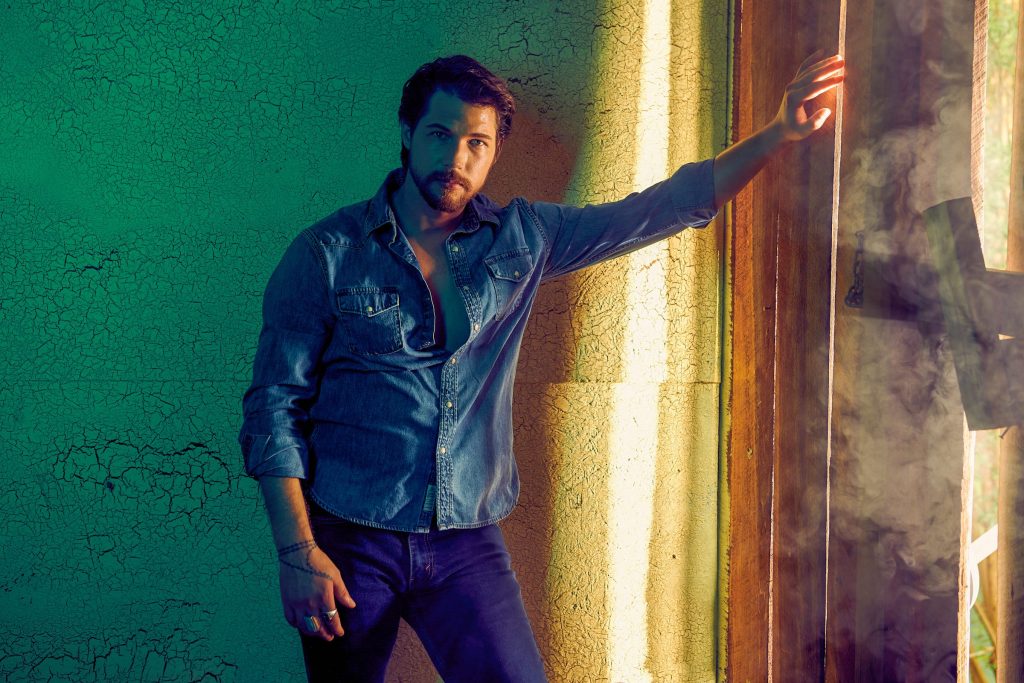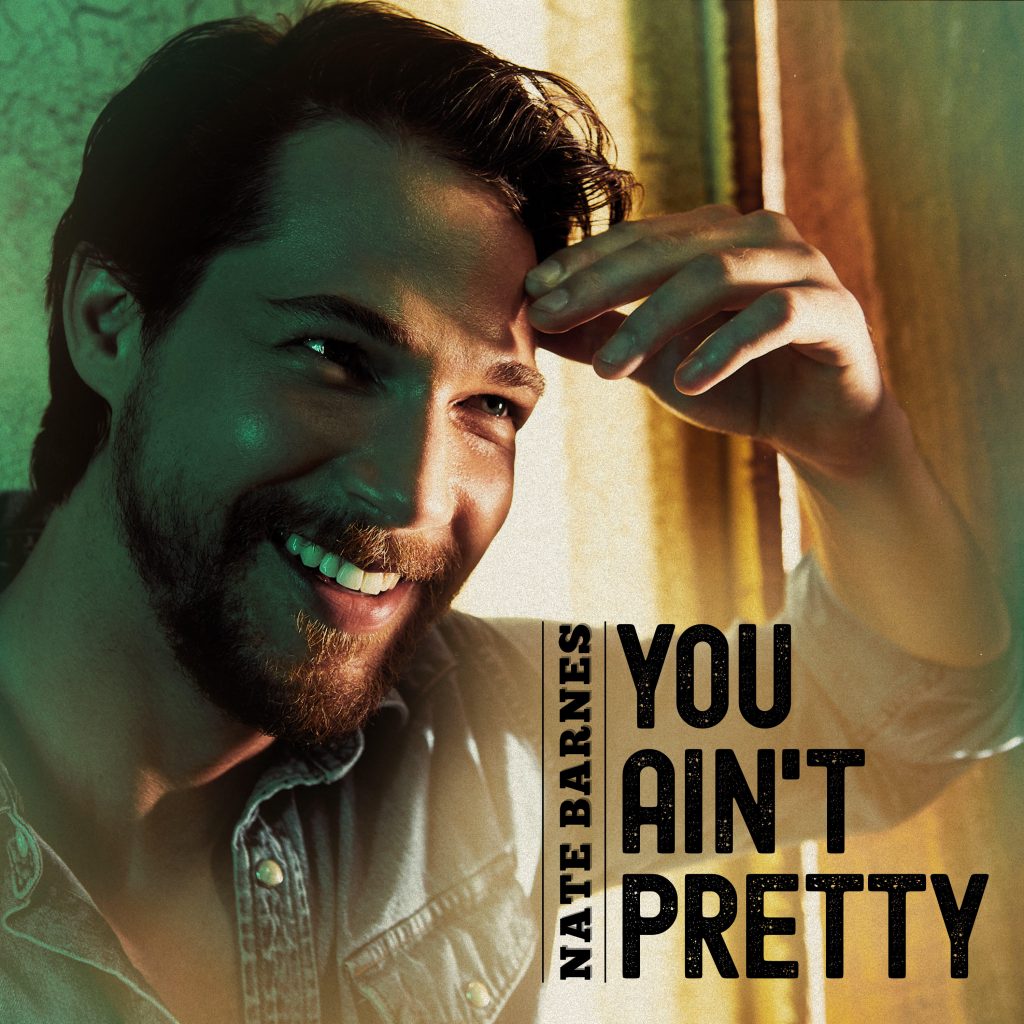We’re debuting the performance video for a meltingly romantic love song from a blue-collar country troubadour.
You might not expect such strong sensitivity from a hardworking working-class guy, but Nate Barnes is full of surprises. The former nuclear power plant employee comes from South Haven, Michigan, on the shores of Lake Michigan, where he spent years playing bars, coffee shops, small venues, and festivals.
On a trip through Nashville, he met award-winning singer-songwriter Jason Sellers. That chance encounter led to a meeting with pioneering Music Row label head Benny Brown, eventually landing Barnes a record deal with Quartz Hill Records.
Barnes writes and sings about faith and family, work and heartache, love and the simple joys of life.
He co-wrote “You Ain’t Pretty” alongside Sellers (“Don’t You Wanna Stay” — Jason Aldean/ Kelly Clarkson) and Jimmy Yeary (“I Called Momma” — Tim McGraw). Produced by Mickey Jack Cones (Jason Aldean, Thomas Rhett) and Derek George (Dustin Lynch, Randy Houser), the song came out on October 30, and we’re debuting the lyric performance video (directed by Glenn Sweitzer) right here.
We talked with Barnes about the song, the video, and his formative blues influences.
Cowboys & Indians: Congrats on the recent release of “You Ain’t Pretty.” Just so people don’t misunderstand and misjudge by the title, tell us about the meaning of the song and how and why you came to record it.
Nate Barnes: “You Ain’t Pretty” connects with me personally and it hopefully will connect with others, too. The main meaning behind this song is to build people up and not tear them down. There are so many things and people that try to tear us down every day — through social media and in other ways. This is a song that I feel women really need to hear. It’s about the inner beauty within a woman.
When I wrote this song with Jason Sellers and Jimmy Yeary, who are both incredible award-winning writers, it just really came from all our hearts. I think this song articulates how so many guys feel about their significant others. They may not know how to say it, but this is how they feel inside, and when they hear this song hopefully it’s going to spark a moment.
C&I: Tell us about making the performance lyric video.
Barnes: This was my first performance video to make as an artist and it was so much fun to do. I think Glenn Sweitzer did an amazing job. We wanted to do something a little different. It’s not a simple, standard lyric video. It actually looks like a full-on music video. We went into Glenn’s studio and filmed in front of this really cool backdrop of wide-open sky and clouds. The backdrop is an actual photograph that Glenn had taken of the sky and then blown up and enhanced. It looks like the backdrop of a classic movie, which really resonated with me. It kind of reminds me of the old westerns I used to watch with my granddad.
C&I: Your background is interesting — a man with callouses on his hands working blue-collar jobs in Michigan, where you grew up with the blues, and, I assume, Motown. Talk about your musical grandmother and grandfather and their example and effect.
Barnes: My granddad worked his butt off for years and he really instilled the value of a hard day’s work into me. But not only that: He also taught me about love in general — love for people, love for yourself, love for family, and also an immense love for music. My granddad was a music lover and he breathed that into me. I would listen to him talk about the blues for hours, and he would teach me about all the blues guys he loved like Muddy Waters, Bobby “Blue” Bland, B.B. King, and more. I just fell in love with it.
And my grandmother taught me to love music, too. She would play the piano and was always singing. My whole family was always singing, always dancing and always laughing. They really shaped my love of music and my drive to do music somehow. I don’t know if they know it, but they’re responsible for all this!
C&I: A friend introduced you to country music when you were 21, after which the blues and country melded together in your own music. Both blues and country are typically portrayed as authentic working-class genres. What attracts you to the blues? To country?
Barnes: If it wasn’t for my friend Dennis introducing me to country, I wouldn’t be here today. When it comes to the blues, it was always about the feeling the music gave me from start to finish. I could connect with every single note and every single word. And then when I discovered country, the same thing happened all over again. But it was different, too. It felt like what I had been missing my whole life. Country music tells the truth — there’s no fluff in it. I think before that age, I just wasn’t ready to hear the truth. I wasn’t ready to talk about pain and struggles and feel that sort of thing in a real way until I was a bit older. Country music really embodies how we get through this life — the good and the bad walking side by side. I’m so thankful to have a shot at doing this for a living. It’s an honor for both me and my family to be here.
C&I: What blues artists did you grow up listening to, what country artists got added to the mix, and who do you listen to these days?
Barnes: B.B. King was a big one for me. He was a friend of the family, and I got to meet him a couple of times. I also loved Stevie Ray Vaughan, Jonny Lang, and Muddy Waters, among many others. Some of the first country artists I discovered and loved were George Strait, Keith Whitley, and Brooks & Dunn. And today? That’s such a hard question because I love so many artists! I love Blake Shelton, Chris Stapleton, Tyler Childers, Morgan Wallen. I think Luke Combs is just unbelievable — I really love his songwriting. There are so many more that I want to name, but we’d be here all day!
C&I: Your bio leads with this quote from you: “Country music teaches you about life — about how to live, about how to be and about how to treat people. It made me feel things that I didn’t want to feel and that shifted my whole deal. It changed how I lived, how I thought, and my whole perspective on life.” Explain the shift you talk about — from what to what?
Barnes: It really shifted who I was as a person and the type of man I wanted to become. Before that, I don’t know if the path I was heading toward was a particularly good one. To me, it’s more of an inner thing. In a way, I feel like the music almost saved my life. Not only did it change what I wanted to do with my life for a career, but it shifted who I am, how I think, what I believe in, how I treat people. Before, I just thought about myself, not about other people. I’m not perfect by any means, but today I think so much more about how my actions impact other people and their feelings — more than I ever did before.
For more information about Nate Barnes, visit his website, or follow him on Facebook, Instagram, and Twitter. Listen to and/or purchase “You Ain’t Pretty” here.
















